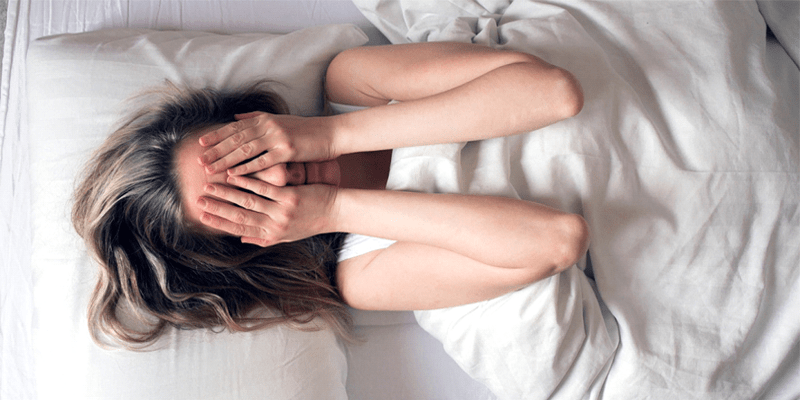How Stress Effects Your Sleep and What You can do to Improve it
Stress is something that most of us go through once in a while. Just the right amount of stress is helpful because it keeps you alert and full of energy, but too much of it can affect every part of your life and also prevent you from getting a good night’s rest. Stress impacts your life in many ways, for example, if you lie awake in your bed feeling anxious and worried, it will be very hard for you to get a decent sleep because your mind isn’t relaxed. People who suffer from chronic stress hardly have any sleep which makes it very hard for them to function properly during the day.
When you don’t sleep well at night your body keeps producing the stress hormones leaving you feeling more stressed the following day, then at night you hardly sleep and the cycle continues. Some of the most common signs of stress apart from lack of sleep include tension, depression, anxiety, and lack of focus. Physically you will have headaches, loss of appetite, fatigue, upset stomach, back or neck pains.
How does stress affect your health and sleep?
You’re not able to get quality sleep
When you’re stressed you tend to toss and turn in your bed the whole night or you just lie awake in bed. This makes you feel lazy and sluggish the next morning because you have had little or no sleep at all. While sleeping hours may vary from person to person, it’s recommended that you sleep 7-9 hours every night. Stress messes with the quality of your sleep stealing important hours of sleep because your mind is busy with anxiety.
Your brain is on overdrive preventing you from drifting off
Stress interferes with your body preventing it from switching from an active state to a much calmer one. Being overly worried keeps your sympathetic nervous system part of your brain active which sends your brain into overdrive. This keeps you awake for the better part of the night. Stress can create a vicious cycle where you end up having many sleepless nights.
Increases your risk of Insomnia
Some people have a habit of always being consistently worried about everything, which keeps them awake at night. Chronic worrying will not only rob you of precious hours of sleep but can also cause you not to fall asleep entirely. This will put you at a high risk of insomnia and the more things you worry about the more the risk of the disorder.
Factors that contribute to your lack of sleep
Anxiety
When you’re overthinking or anxious about something it will be very difficult for you to have a good night’s rest as you will keep waking up at night. Anxiety keeps your mind preoccupied with worry and you keep imagining bad things happening and what will happen next. Your mind then starts racing to find solutions for all the bad scenarios you have imagined. When your mind is racing like that it increases the level of the stress hormones making it difficult to sleep.
Caffeine
Taking caffeine can increase your stress levels and significantly affect the quality and quantity of sleep you get. If you’re stressed you will tend to drinks a lot of caffeine in the morning to help you get through the day.
Overthinking
When you’re having a demanding workload that you’re supposed to finish, you will most likely carry your work home to finish it. This makes it difficult for you to come home and just switch off the stresses of work. If you’re trying to solve problems the whole day and even when you come home your mind won’t turn off, it will be difficult for you to have quality sleep.
How to manage your stress and improve your sleep
Exercise
Exercising helps to lower your stress levels and improve the quality of sleep. It improves your mental and physical health and is very effective at reducing the symptoms of stress and anxiety. Doing some moderate or intense workout for about 30 minutes can help reduce your stress levels and improve on your sleep. However, make sure you don’t work out right before you go to bed as it will keep you awake. The best time is early in the morning or in the afternoon.
Create a Relaxing Environment
Create the right environment that will make your body feel relaxed to induce sleep. Your bedroom should have cooler temperatures, darker lights, and with no noise for a better chance of calming your mind so that you can drift off fast. Also having a comfortable bed like a loft bed, for example, will greatly contribute to putting your body in a cozy position for a restful night. You could also take a shower before you sleep to lower your body temperature to help you sleep faster.
Relax your Mind
You can try relaxing techniques like Yoga, breathing techniques or meditation to relax your mind or you can just take a walk in the evening and breath in the fresh air to calm and clear your mind. Practice these techniques 10-30 minutes before you go to sleep to help reduce your stress levels and help you sleep better at night.
Eat a healthier diet
You most likely know that eating healthy means eating more fruits, veggies, lean proteins, and whole grains while taking less of sugars, caffeine, and alcohol. Drinking caffeine so close to your bedtime will increase your anxiety levels and you won’t be able to sleep well while taking alcohol will increase your heart rate which will keep you awake all night. Taking water is a better choice but not too much so that you don’t keep waking up in the middle of the night to go to the bathroom and interrupt your beauty sleep.
Final Thoughts
If after trying all the above methods and none seems to be working, it’s best to visit your doctor or a counselor for specialized treatment. It’s very easy to treat stress and the related problems so that your body and mind can rest.







